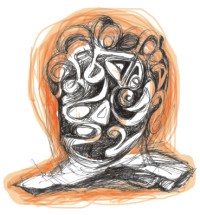one Off
Dialect or Promito Bangla?
Aly Zaker
When this sees the print, Shaheed Dibash, now the International Mother Language Day will be 'round the corner. A lot will have been spoken or written on the subject. So I shall try not to seek the indulgence of the readers' patience to add to their burden. Instead I would like to dwell upon a debate that had started a couple of years back on standardising Bangladeshi Bangla in various media and is also making rounds in various websites where Bangalis surf along and argue about or express their opinion. What should be our Bangla for common use -- a dialect of the language that has emerged in recent times? Or should we use what is known as Promito Bangla? Many of those who propagate the cause of Bangla as in the dialect referred above, say that Promito or standard Bangla that is usually found in books cannot be 'our' Bangla. We should speak, write and express ourselves in the Bangla that we speak in our daily lives. 'We' who? We are those that live in or around the city of Dhaka or some of the towns towards central Bangladesh. One propagator of this once even said that our written Bangla would have to metamorphose to how we usually speak in our day-to-day life in Dhaka. Well, what will happen in the future only future can tell because we live in a dynamic world where things change with the changing times. But this barefaced Dhaka dominance makes me really uncomfortable. The controversy arises when someone tries to impose their opinion as that of a nation. Some writers take it as an affront if it is suggested that we should be speaking in Promito Bangla in proper pronunciation during announcements and while reading news in the media.
Well I am not against using of dialects as the linguistic vehicle in any form of literature. I have myself grown up in a middle class family where we spoke in an admix of Comilla-Brahmmanbaria dialect. But we were taught how to speak Promito Bangla. Though this stood us in good stead later in our life I don't think that dialect is something that we must stay away from. Dialects are like unhindered flow of expressions that come naturally to those who were born in to them. Indeed, some of the most popular and successful plays that I have acted in, namely, "Nural Deener Shara Jiban" or "Dewan Gazir Kissa" (Rangpur and Jessore respectively) were written in dialect. But then these plays and many others like Dhaka Theatre's "Haat Hodai" or quite a few of Aranyak's plays were performed in dialect. So there should be no debate about the use of dialect in any written or spoken art form as long as that expresses the content of a particular area in the language of its own. But a very valid debate may ensue if someone tries to impose that limited scope as the “language of Bangladesh”. No dialect can truly be a pan-Bangladesh language. Imagine a situation of a discussion or seminar where there are speakers from all over the country each having a dialect of their own district. If they start to speak in their own dialect, I dare say, they would definitely not be intelligible to all. Therefore the take out from such a discussion would be reduced to cacophony. It might not be out of place to mention what Rabindranath had once said when he was asked why he did not write something in dialect. He said that he was a poet of Bengal so he has to write in a Bangla that was understood by everyone in Bengal. He said if he had written in Chittagong dialect would he be understood in Rangpur or would a person from Sylhet understand the dialect of Rajshahi?
I remember an argument between one of our leading playwrights and a very famous actress a couple of years ago. The playwright had said "why shouldn't I use hybrid dialect in my plays? It is indeed the language that I speak in." The actress coolly said, “You do; I don't, period.” A very common phenomenon is that very ordinary Bangla words are mispronounced in our electronic media. I think this happens because of the lack of training on speech given in the media concerned. So this has to be redressed by introducing some kind of systematic programme with the incumbent newsreaders by specialist speech trainers now quite easily available in our country. In order to address the mispronunciation of the names of places and people (both local and foreign), the selection of the newsreaders and announcers must be made very carefully. The person who reads the news must 'own' the news. She or he must know the wherewithal of the place or the person she/he is reading about. Or else we shall continue to be plagued by words that would seem strange and ghastly to say the least. Ekushey is also the International Mother Language Day and therefore we should be respectful about the language of others and be careful in dealing with any language from anywhere in the world.
Copyright
(R) thedailystar.net 2010 |
